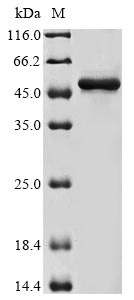Recombinant Human Actin-related protein 3 (ACTR3)
CAT:
399-CSB-BP001249HU-03
Size:
1 mg
Price:
Ask
- Availability: 24/48H Stock Items & 2 to 6 Weeks non Stock Items.
- Dry Ice Shipment: No




Recombinant Human Actin-related protein 3 (ACTR3)
- CAS Number: 9000-83-3
- Gene Name: ACTR3
- UniProt: P61158
- Expression Region: 2-418aa
- Organism: Homo sapiens
- Target Sequence: AGRLPACVVDCGTGYTKLGYAGNTEPQFIIPSCIAIKESAKVGDQAQRRVMKGVDDLDFFIGDEAIEKPTYATKWPIRHGIVEDWDLMERFMEQVIFKYLRAEPEDHYFLLTEPPLNTPENREYTAEIMFESFNVPGLYIAVQAVLALAASWTSRQVGERTLTGTVIDSGDGVTHVIPVAEGYVIGSCIKHIPIAGRDITYFIQQLLRDREVGIPPEQSLETAKAVKERYSYVCPDLVKEFNKYDTDGSKWIKQYTGINAISKKEFSIDVGYERFLGPEIFFHPEFANPDFTQPISEVVDEVIQNCPIDVRRPLYKNIVLSGGSTMFRDFGRRLQRDLKRTVDARLKLSEELSGGRLKPKPIDVQVITHHMQRYAVWFGGSMLASTPEFYQVCHTKKDYEEIGPSICRHNPVFGVMS
- Tag: N-terminal 10xHis-tagged and C-terminal Myc-tagged
- Source: Baculovirus
- Field of Research: Immunology
- Assay Type: In Stock Protein
- Relevance: ATP-binding component of the Arp2/3 complex, a multiprotein complex that mediates actin polymerization upon stimulation by nucleation-promoting factor (NPF) (PubMed:9000076). The Arp2/3 complex mediates the formation of branched actin networks in the cytoplasm, providing the force for cell motility (PubMed:9000076). Seems to contact the pointed end of the daughter actin filament (PubMed:9000076). In podocytes, required for the formation of lamellipodia downstream of AVIL and PLCE1 regulation (PubMed:29058690). In addition to its role in the cytoplasmic cytoskeleton, the Arp2/3 complex also promotes actin polymerization in the nucleus, thereby regulating gene transcription and repair of damaged DNA (PubMed:17220302, PubMed:29925947). The Arp2/3 complex promotes homologous recombination (HR) repair in response to DNA damage by promoting nuclear actin polymerization, leading to drive motility of double-strand breaks (DSBs) (PubMed:29925947). Plays a role in ciliogenesis (PubMed:20393563).
- Purity: Greater than 85% as determined by SDS-PAGE.
- Activity: Not Test
- Length: Full Length of Mature Protein
- Form: Liquid or Lyophilized powder
- Buffer: If the delivery form is liquid, the default storage buffer is Tris/PBS-based buffer, 5%-50% glycerol. If the delivery form is lyophilized powder, the buffer before lyophilization is Tris/PBS-based buffer, 6% Trehalose, pH 8.0.
- Reconstitution: We recommend that this vial be briefly centrifuged prior to opening to bring the contents to the bottom. Please reconstitute protein in deionized sterile water to a concentration of 0.1-1.0 mg/mL.We recommend to add 5-50% of glycerol (final concentration) and aliquot for long-term storage at -20℃/-80℃. Our default final concentration of glycerol is 50%. Customers could use it as reference.
- Molecular Weight: 51.1 kDa
- References & Citations: "Actin polymerization is induced by Arp2/3 protein complex at the surface of Listeria monocytogenes." Welch M.D., Iwamatsu A., Mitchison T.J. Nature 385:265-269 (1997)
- Storage Conditions: The shelf life is related to many factors, storage state, buffer ingredients, storage temperature and the stability of the protein itself. Generally, the shelf life of liquid form is 6 months at -20℃/-80℃. The shelf life of lyophilized form is 12 months at -20℃/-80℃.
